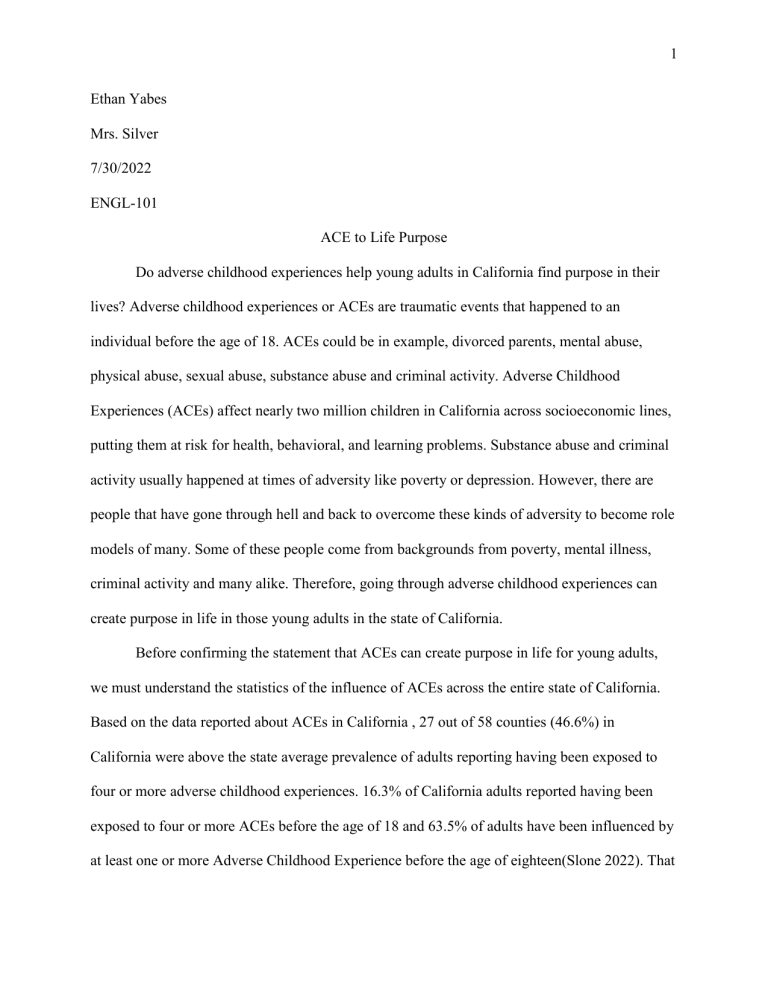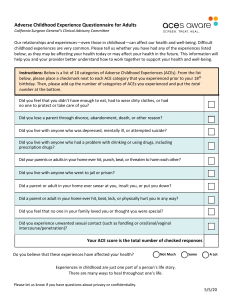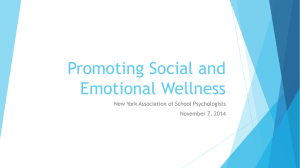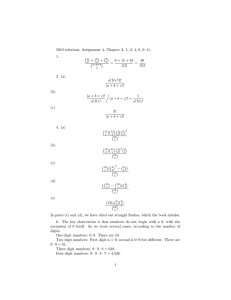
1 Ethan Yabes Mrs. Silver 7/30/2022 ENGL-101 ACE to Life Purpose Do adverse childhood experiences help young adults in California find purpose in their lives? Adverse childhood experiences or ACEs are traumatic events that happened to an individual before the age of 18. ACEs could be in example, divorced parents, mental abuse, physical abuse, sexual abuse, substance abuse and criminal activity. Adverse Childhood Experiences (ACEs) affect nearly two million children in California across socioeconomic lines, putting them at risk for health, behavioral, and learning problems. Substance abuse and criminal activity usually happened at times of adversity like poverty or depression. However, there are people that have gone through hell and back to overcome these kinds of adversity to become role models of many. Some of these people come from backgrounds from poverty, mental illness, criminal activity and many alike. Therefore, going through adverse childhood experiences can create purpose in life in those young adults in the state of California. Before confirming the statement that ACEs can create purpose in life for young adults, we must understand the statistics of the influence of ACEs across the entire state of California. Based on the data reported about ACEs in California , 27 out of 58 counties (46.6%) in California were above the state average prevalence of adults reporting having been exposed to four or more adverse childhood experiences. 16.3% of California adults reported having been exposed to four or more ACEs before the age of 18 and 63.5% of adults have been influenced by at least one or more Adverse Childhood Experience before the age of eighteen(Slone 2022). That 2 is more than half of the adults in California and is more surprising because you could be meeting someone who is bright, cheerful, positive and gets along with everyone but at home, they could be going through something deeper at home and is actually suffering because nobody knows because they hide it under a facade. Now that we have the statistical standpoint about the influence of adverse childhood experiences taken care of, who are these people that have overcome these adverse childhood experiences and have become role models for many? One of these people is former boxing champion, Manny “Pacman” Pacquiao. Manny Pacquiao, considered to be one of the greatest boxers of all time, the first boxer to capture 14 world titles in eight weight classes including three Ring Magazine championships, media celebrity, and politician, the so-called “Heart and Pride of the Philippines,” didn’t always have the brightest beginnings. Born in Bukidnon and raised in General Santos City, had in a sense a couple of adverse childhood experiences before he became a boxer. His family separated when he was in sixth grade because his father, Rosalio Pacquiao, had an affair with another woman. At the young age of fourteen, he moved to Manila and lived in the streets and worked as a construction worker. Every day was a struggle for Pacquiao as the pay was so little at one point that he had to decide whether to have food for himself to eat for the night or to send it to her mother. During this time, he stopped going to school because of his extreme poverty. However, in the midst of this adversity, he found boxing at the age of twelve by his uncle. He gained inspiration from the loss that Mike Tyson had against James “Buster” Douglas. He began training and taking fights for money while working as a construction worker. In his first fight, he only won $1.50 from a victory. He became a professional at sixteen and after that, history wrote itself. Even after his decorated career as a professional boxer, his legacy stayed as one of the best boxers in the 21st century as well as created a pathway for many Filipinos to follow his footsteps 3 and become a boxer. As Pacquiao said in an interview with China Daily, “"I wanted to become the best Filipino fighter in order to leave a legacy for my countrymen, so that the whole world would know that we Filipinos can excel in a sport that doesn't just depend on brute strength, but on strategy and quick thinking”(China Daily 2017). After his boxing career, he was elected to the House of Representatives in the 15th Congress, representing the Sarangani province. He was later re-elected in 2013, and 2016 to a six-year term as a senator. He also had a small stint as a basketball player in the Philippine Basketball Association(PBA) in 2014. This goes to show that despite the chaos and the adversity, there is always a light that shines in the dark that can be taken and guide you to find purpose in life. Another example of people who have overcome these adverse childhood experiences is Soko Morinaga. In his essay, “The Struggle to Become a Zen Monk,” he explains all of his adversities he had to endure after World War II. First, he got sent to war because he was a liberal arts student and science based students stayed to research on the study of medicine in the future. When he got the papers to go to war, both of his parents died and only had two days to mourn their deaths before metaphorically marching to death. Fortunately, he lived through the war but he came back with frozen bank deposits from his fathers insurance money, inflation and no land left in his possession because of the Land Reform Program, which took away his fathers land which he could have used for various ways. After all this, he could not think of an idea to make some money with his own two hands and he lost his ethical standard to live and work to support himself. He felt like he was just a shell for a body with no soul, no motivation and not ethical way to live. He felt this way until he stated, “...the real reason I no longer knew what to do with my life was that I had only read books and theorized about things, without ever imposing any discipline upon myself”(Morinaga 14). After saying this, he knocked on the doors of several Zen 4 temples and found a mentor, Goto Zuigan Roshi, master of Daishuin temple in Kyoto. After some amazing learning experiences from Roshi, he had to enter the monastery to train to become a zen monk. He got turned down by the gate man and he had to wait outside for three days in the freezing cold. During his wait, his entire body was crumbling and wearing down from the cold and the lack of food and water. So many thoughts rushed in Soko's head, thinking that it was not worth this kind of sacrifice but he kept moving on. At the end of the third day, he was let into the monastery and later underwent training to become a zen monk. Despite all the loss, adversity, mental and physical trauma that Soko had to go through, it made him realize that he needed to find a better way to live and it gave him a purpose in life. It goes to show that with pain and suffering, comes enlightenment and accomplishment. Now it is understandable that Adverse Childhood Experiences cannot find purpose in life. From the website with the statistics about ACEs in California, people with four or more ACEs are around four times more likely to suffer from depression and thirty times more likely to commit suicide. Not only does it lead to depression, it also leads to addiction as people with four or more ACEs are three times more likely to smoke, seven and a half more likely to experience alcoholism and ten times more likely to use injection drugs. These numbers can be quite intimidating and be true however, the main point around finding purpose in life is making the effort to try and use what is left of you to create a platform for yourself to build yourself upon towards success. People like Shia LeBouf, Ariana Grande, Pete Davidson, Kevin Love, have undergone many forms of ACEs and trauma during their childhood and their lives but have kept fighting to build their platform and become great icons. In conclusion, Adverse childhood experiences or ACEs are traumatic events that happened to an individual before the age of 18. Adverse Childhood Experiences (ACEs) affect 5 nearly two million children in California across socioeconomic lines, putting them at risk for health, behavioral, and learning problems. Based on examples and data given, going through adverse childhood experiences can create purpose in life in those young adults in the state of California. Examples of people that have overcome these ACEs and become role models for their respective expertise and for their country are Manny Pacquiao and Soko Morinaga. It is possible to find purpose in life through ACEs but, these ACEs should not be ignored and it has to be intervened before it worsens. Proper sleep, physical activity and eating your meals are really important for proper mental and physical health. In a study, it is stated “college students who do not usually exercise after regular moderate-intensity physical exercise, the self-feeling of sleep has been greatly improved, and the percentage of the number of students who fall asleep for a long time has decreased significantly, indicating that had a long time to fall asleep after physical exercise have significantly shortened the time to fall asleep and become more likely to fall asleep”(Zou 2022). A point that can help in preventing these mental health problems relapsing is self awareness. In another study, it is stated “trait mindfulness will moderate the association between timing of exposure and trauma symptoms, wherein this association will be stronger for those with low level of mindfulness”(Ibañez 2022). Life is a roller coaster of emotions and adversity so it is understandable to feel down and defeated, but choosing to end your life is only a permanent solution to a temporary problem. Seek professional help, talk to someone and treat your body and mind sometimes and these problems can be moderated and even resolved. 6 Works Cited Ibañez, Gladys E., et al. “Acting with Awareness Moderates the Association between Lifetime Exposure to Interpersonal Traumatic Events and Craving via Trauma Symptoms: A Moderated Indirect Effects Model.” BMC Psychiatry, vol. 22, no. 1, Apr. 2022, pp. 1–14. EBSCOhost, https://doi-org.fcep.ohlone.edu/10.1186/s12888-022-03931-1. Soko, Morinaga. “My Struggle to Become a Zen Monk.” Zen Tradition & Transition, edited by Kenneth Kraft, Grove Press, 1988, pp.13-24. Slone, Latesa. “Adverse Childhood Experiences - Let’s Get Healthy California.” Let’s Get Healthy California, 2 Feb. 2022, letsgethealthy.ca.gov/goals/healthy-beginnings/adverse-childhood-experiences. “What They Don’t Tell You About Mental Illness | Elizabeth Medina | TEDxSpeedwayPlaza.” YouTube, uploaded by TEDx Talks, 21 June 2016, www.youtube.com/watch?v=ieXB-BGxYwg. Zou, Wen. “Analysis and Research on the Rehabilitation Effect of Physical Exercise on College Students’ Mental Depression Based on Multidimensional Data Mining.” Occupational Therapy International, July 2022, pp. 1–11. EBSCOhost, https://doiorg.fcep.ohlone.edu/10.1155/2022/7656782. “Poverty Gave Pacquiao His Big Push.” China Daily, 17 July 2017, www.chinadaily.com.cn/sports/2017-08/15/content_30626532.html. Sports, Ranker. “The Best Boxers of the 21st Century.” Ranker, 28 July 2022, www.ranker.com/list/best-boxers-of-the-21st-century/ranker-sports.


